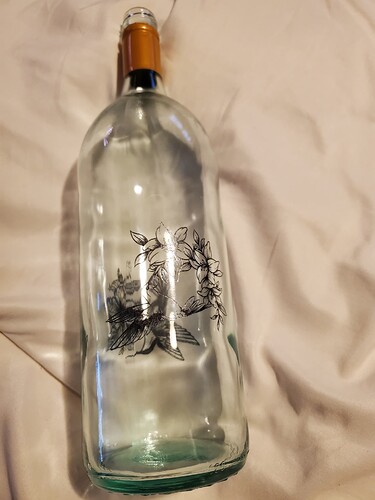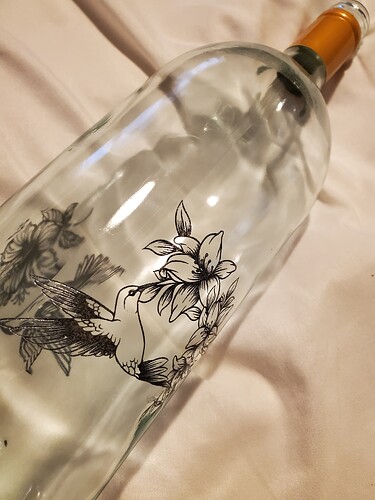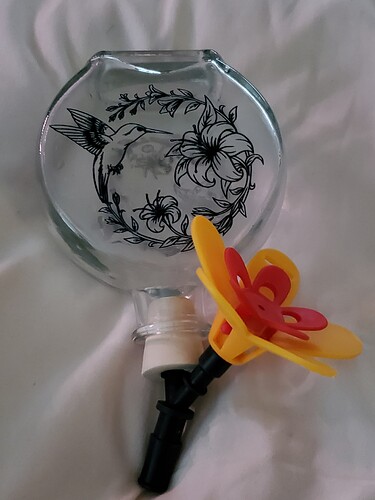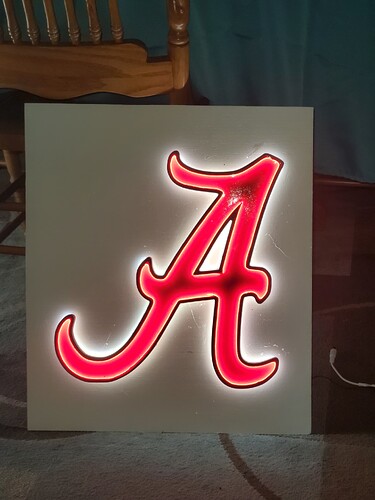One image is upside down, and mirrored image, the other is just mirrored. But this is just a first test, so no big deal. They also need to be a bit larger.
But my wife can paint these with outdoor acrylic, pop a hummingbird feeder/dripper thing in the opening, drill a hole for hanging and you have great little humming bird feeders. (need a smaller bottle for that, but you get the idea).
Looks great… is this your water and TiO2 mixture?
![]()
Yeah, just water and Ti02. But it tends to drip and run, so i need something else. Thinking either just alcohol, so hopefully it’ll evaporate quickly, or hand sanitizer. I saw some that was actually a fairly thick gell.
I’m using that Harbor Freight “detail sprayer”. That’s a great little sprayer for $13. Works really well.
Now, to make some more empty bottles… thankless job.
Turned out really good Jack. I hope you post a photo of the finished project. Would love to see it!
Yes, I got this one from them… probably similar if not the same…
I tried Ethanol (Ever Clear), isopropyl and finally gave up on the alcohols… it’s supposed to dissolve in alcohol, but all of mine separated relatively quick.
Combine this with >100 F temperatures and an extremely dry SW desert environment, just made it more difficult to deal with the alcohols. It’s also a problem with an air brush as the TiO2 ends up at the bottom of the feed and has a tendency to plug up the air brush.
Haven’t tried it with the Harbor Freight model, don’t know if I want to risk it…
Looks pretty good to me …
![]()
I’m not sure where you found that information but TiO2 won’t be soluble in any solvents to any appreciable extent. Its solubility is so low as to be considered insoluble. It would be soluble to some extent in some strong acid and alkaline solutions but only by forming ‘complexes’ with the ions in the solution. As such it wouldn’t be a practical solution (if you’ll forgive the pun!).
Yes, another one of the multiple, not quite true sites I ended up at…
I did find some chemical doctor explain it more like you do…
TiO2 is not usually soluble in common polar or non-polar solvents. The solubility of titanium dioxide is related to solutes. It is insoluble in dilute alkali, dilute acid, but soluble in hot concentrated sulfuric acid, hydrochloric acid, hydrofluoric acid and nitric acid but not in the form of TiO2 but as a salt like sulfate, chloride, nitrate etc. Titanium dioxide can melt in the alkali (sodium hydroxide, potassium hydroxide) or alkali metal carbonate (sodium carbonate, potassium carbonate). Any one of which i have mentioned with Titanium dioxide can be transformed into soluble acid titanate.
Probably more than most of us wanted to know… doesn’t appear to dissolve in anything that we could really make use of…
![]()
Yes, the internet is a wonderful resource but unfortunately there’s a lot of misinformation out there.
If you need something that evaporates very fast, try methylene chloride (known in the paint world as Reducer). Throw a cup of it on the floor and it will evaporate before you can get a rag to wipe it up. Non-flammable but must be used in well-ventilated area (like a paint booth) or outdoors.
If your gun has O-rings, replace them with Viton (another Harbor Freight item).
Methylene Chloride ( AKA Dichloromethane) was also used in paint strippers such as Nitromors but such strippers were banned in the EU many years ago. It’s also used as a solvent ‘glue’ to bond extruded acrylic. I think you can still get hold of it but its nowhere near as easy to obtain nowadays (at least here in the UK). It has a very low boiling point of 39.6°C and as you say, evaporates very quickly. In my experience it even seems to evaporate ‘through’ HDPE containers but seems ok in metal cans. It’s pretty nasty stuff so as you rightly say you need to use it either outside or in a well ventilated area.
I went with TiO2 in water to get away from the toxic paints and other chemicals used for glass adhesion …
Thanks for the description…
![]()
Elmer’s White Glue is safe!
Elmer’s
91% Isopropyl
Titanium Dioxide
If there are any royalties to be had, I want 10%…!
Absolutely agree, aqueous is definitely preferable ![]()
![]()
I will do that. I got a couple better bottles at Hobby Lobby. And, the good thing about them is they’re not round, so you don’t even need a rotary attachment! I’ll know which way is up! Yay!
We normally spend our summers at the lake/campground. And they have lots of humming birds there. The first time we put feeders out, they found them in about 5 minutes, and were fighting all day long. So now we have about 8 or so feeders we put out, and people just love watching them all day.
So this will probably be one of the things we sell at their craft show/yard sale.
That was going to be my next trial. I figured something to give it some body, and the alcohol to evaporate quickly.
The water works “ok”, if you keep the sprayer fairly far away. So you get a very light coat, and it since it’s so light, it dries fairly quick (or doesn’t run as much). But I think (judging from the mess), it wastes a lot in over spray.
I’m not too sure about trying to dissolve in anything, and then use it in that sprayer. I think anything too acid or base, will just eat up the aluminum parts.
Supposed to rain here for a couple days, which means no work on the house (or not much anyway) so I’ll have time to test it out a little bit. Maybe by the end of the week I’ll have something.
Be sure to post your results. From what I read, the RoyClark formula/procedure seems to be the most popular. If someone comes up with a better process, I am sure everyone else will want to know.
Raining here too, but my duct fan has not arrived. No burning until I can get the duct-to-outdoors system finished. Homemade carbon filter was not good enuff fo indoors (translation - expensive failure).
Yeah, I did a lot of reading on that thread, several times.
I think I finally have something that works, for me.
And yep, I need a better duct fan. I got one from Lowe’s and it just barely works. So I’m trying something bigger, but they don’t carry “bigger”.
My first test didn’t turn out so good. The Ti02 coating, was just too light. The image was just gray and not black. The image was also too small, and it was still upside down! (I forgot, these hang upside down…)
So this is what I ended up with. You’ll have to excuse the precise measurements, I used just what was on hand from previous sprays.
I figured, the smoothness of the glass was an issue, that’s why it was running, or or the thin coat cracking when it dried.
So one thing I did was to spray a fairly light coat with mostly alcohol, a bit of water, a little white glue and the Ti02. Spray it, and just let it dry. Then I can go back and spray a heavier coat, because now the spray has something to stick to. I did this spray with mostly alcohol and TiO2.
It was pretty warm and sunny, the bottles had been left out to dry, so they were pretty warm. You could see the alcohol mixture evaporate pretty quickly as it was sprayed. So, as it dried, I just sprayed some more until I felt like it was heavy enough.
It looks pretty good. But I still have a little white around the edges of the black. I scrubbed it with a small child’s toothbrush (they’re soft). And can’t seem to get it all. Not sure if this is an artifact of the LASER process, or it just needs to soak more. So it’s soaking now, hot water and a little Dawn dish washing detergent.
(if you look too closely, you’ll see the failed image on the backside, so this is just a test)
Next step is to drill a hole in the top for a hanging hook and for my wife to paint it with some epoxy paint. Clear epoxy mixed with some powdered pigments we got off of Amazon for another project.
(The other project, lighted Alabama logo)
Pretty good! I hope my first trials with that medium comes out as good.
Update:
Since there was some question about if this was actually melting the glass or not in the original RonClarke method thread…
I did notice a couple of things.
The white around the edges, some of it does seem to come off with soaking and scrubbing. But not all of it. So I’m thinking this is a LASER artifact, and I probably need to work on the settings a little more. Find something that doesn’t do that.
Also, while scrubbing with a stiffer brush, some of the black “popped off”.
So… I looked at it with a 20X magnifier, and the Ti02 looks to me, like it has turned to a black “glass like” substance. And the glass surface (of the object) indeed looks like it has been melted just a bit (where it has popped off).
I’m guessing, that when you hit the Ti02 with a LASER, it’s much like using a magnesium fire starter. It’s perhaps ignighting (and burning hotter), but only very locally (where the LASER hits it, and doesn’t keep going). And the temperature of that localized burn, is hot enough to melt just the surface of the glass (or tile), which allows the black “glass like” substance to bond to the glass (object) or tile.
So, scrubbing good, too hard of a brush and scrubbing hard, bad…



